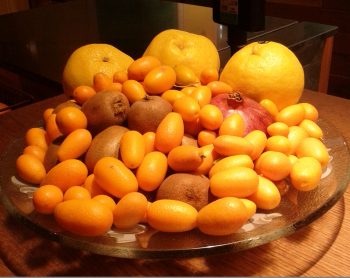Hebrew Fruits Vocabulary Posted by Ayana on May 21, 2018 in Uncategorized
The first step to realize my New Year’s resolution – losing weight – was to drop all the snacks I’ve enjoyed between meals. No more Bamba or Cow Chocolate for me. From now on – only fruits to maintain my sugar level.
Fig תְּאֵנָה
On a diet, figs are definitely a better option than a chocolate bar or a peanut butter snack.
Fig (feminine) = תְּאֵנָה (te-e-na)
Figs = תְּאֵנׅים (te-e-nim)
The Hebrew word for fig follows the basic rule of the Hebrew grammatical gender and ends with ה as most feminine nouns do. Correspondingly, its demonstrative pronoun will be feminine as well – זוֺ (zo) or זֺאת (zot). Hebrew has two feminine demonstrative pronouns: זֺאת from the bible, and זוֺ from a later period. There isn’t a difference between them, they both mean and function the same, and you can use them alternately. For example:
שׂׅים לֵב שֶׁחֵלֶק מֵהַתְּאֵנׅים לֺא טְרׅיּוֺת. זוֺ לְמָשָׁל, רְקוּבָה.
Note that some figs aren’t fresh. This one, for example, is rotten.
זֺאת תְּאֵנָה טְרׅיָּה, קָנׅיתׅי אוֺתָה הַיּוֺם.
This fig is fresh, I bought it today.
Apple תַּפּוּחַ
“An apple a day keeps the doctor away” (תַּפּוּחַ בְּיוֺם וְלָרוֺפֵא שָׁלוֺם) is one of my favorite slogans. It makes me feel thin and healthy. Although it doesn’t really make me eat an apple every day, I do enjoy apples frequently. They are sold year-round in Israel, and they are always fresh and juicy.
Apple (masculine) = תַּפּוּחַ (ta-pu-ah)
Apples = תַּפּוּחׅים (ta-pu-him)
Unlike fig, the Hebrew word for apple ends with a consonant, as most masculine nouns do. Therefore, its demonstrative pronoun will be masculine as well – זֶה (ze).
הַתַּפּוּחַ הַזֶּה הוּא מׅזַּן “גרניסמית״, והתפוח הַזֶּה מׅזַּן “גאלה״.
This is a Granny Smith apple, and this one is Gala apple.
Summer fruits פְּרוֺת קַיׅץ
Watermelon, grapes, and melon, on the other hand, will be in the market only during the summer. They are very refreshing desserts in the Israeli humid summer, because they contain lots of water. Especially watermelon that contains about 90 percent water. The sugar content in grapes is higher than in watermelon, and frozen grapes from the freezer are nice snack during hot day.
Watermelon (masculine) = אֲבַטִּיחַ (a-va-ti-ach)
Watermelons = אֲבַטִּיחׅים
Melon (masculine) = מֶלוֹן (me-lon)
Melons = מֶלוֹנׅים
Grape (masculine) = עֵנָב
Grapes = עֲנָבִים(a-na-vim)
There are several Hebrew demonstrative pronouns for plural nouns:
- הֵם (em) means “they”.
- אֵלֶּה (e-le) and אֵלּוּ (e-lu) means “these”. The first is from the bible period, the second is from a later period. Other than that there is no difference between them.
- הַהֵם (a-em) means “those”.
- הַלָּלוּ is a literary pronoun means “these” or “those”.
For example:
אֵיפֹה הָאֲבַטִּיחׅים שֶׁקָּנׅיתָ? הֵם עֲדַיִן בָּאוֺטוֺ.
Where are the watermelons you bought? They are still in the car.
הָעֲנָבִים הָאֵלֶּה הֵם לְלֺא גַּרְעׅינׅים.
These grapes are seedless.
אַל תּׅדְאָג, הַמֶּלוֹנׅים הָאֵלּוּ טוֺבׅים, הַמֶּלוֹנׅים הַהֵם לֺא.
Don’t worry, these melons are good, those melons are not.
תּוֺדָה לָאֵל עַל הַפְּרוֺת הַלָּלוּ!
Thank God for these fruits!
More fruits עוֺד פְּרוֺת
Plum (masculine) = שְׁזִיף
Banana (feminine) = בָּנָנָה
Cherry (masculine) = דֻּבְדְּבָן
Psidium (feminine) = גּוּיָאבָה
Mango (masculine) = מַנְגּוֹ
Kiwi (masculine) = קִיוִי
Peach (masculine) = אֲפַרְסֵק
Citron (masculine) = אֶתְרוֹג
Nectarine (feminine) = נֶקְטָרִינָה
Pomegranate (masculine) = רִימּוֹן
Apricot (masculine) = מִשְׁמֵשׁ
Orange (masculine) = תַּפּוּז
Pineapple (masculine) = אָנָנָס
Papaya (feminine) = פָּפָּיָה
Grapefruit (feminine) = אֶשְׁכּוֹלִית
Loquat (masculine) = שֶׁסֶק
Strawberry (masculine) = תּוּת
Lemon (masculine) = לִימוֹן
Tangerine (feminine) = קְלֶמֶנְטִינָה
Passion fruit (feminine) = פָּסִיפְלוֹרָה
Coconut (masculine) = קוֹקוּס
Pear (masculine) = אַגָּס
Persimmon (masculine) = אֲפַרְסְמוֹן
Use this list to practice distinguishing between masculine and feminine nouns. Note the list follows the basic rule, according to most feminine nouns end with ה or ת; most masculine nouns end with consonant. Every rule has exceptions, as you can notice in the list above.
To practice the correct pronunciation of some of the fruits above watch this video. Note that the video includes vegetables as well.
For advanced Hebrew listening comprehension watch this video (with Hebrew subtitles). The show is about local fruits and exotic fruits from all over the world. Can you recognize the fruits vocabulary we’ve learned today?
Keep Calm and Learn Hebrew

Build vocabulary, practice pronunciation, and more with Transparent Language Online. Available anytime, anywhere, on any device.






Comments:
Ayana:
Thanks for your comment!I believe fruit vocabulary is very useful.